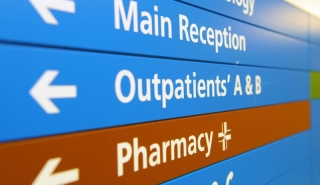Laboratory Medicine
General Information / Cytology Specimen Collection
Diagnostic Cytology Specimen Collection Information:
All samples:
Request forms and sample bags: Please ensure the request form is fully and legibly completed with relevant clinical details and attached to the outside of the sample bag. Sample bags with a pocket are available for this purpose.
Delivery: Send all samples to the laboratory as soon as possible. If delays are expected, unfixed samples should be refrigerated. Please see additional notes for ‘Out of Hours’ samples.
Please ensure all lids are secured and not cross threaded before sending to the laboratory.
Serous fluids (pleural, ascitic and pericardial fluids): Fresh samples, ideally of a minimum volume of 50-75mL should be sent in 50mL or 100mL specimen containers (RCPath, 2019). If the sample is from a drain, ensure this is well mixed for representative sampling. Please ensure specimen containers are not filled to the top to minimise risk of leakage.
Breast seroma fluid for assessment for Breast Implant Associated Anaplastic Large Cell lymphoma (BIA-ALCL): The entire seroma fluid should be aspirated and sent fresh. 100ml specimen containers are available and several may be used.
Peritoneal washings: These should be sent in 25, 50mL or 100mL containers according to the volume collected.
Endoscopy samples: Samples from endoscopy clinics for cytology (brushings, washings, and endobronchial ultrasound bronchoscopy (EBUS)) should be placed into a 25ml universal container, supplied to the clinic containing 15mL CytoRich Red (CRR) fluid.
Fine Needle Aspiration (FNA) – Needle washings: The needle must be rinsed in a 25ml universal container, supplied to the clinic containing 15mL CRR.
Fine Needle Aspiration (FNA) direct spread air-dried slide preparations: These should only be prepared by adequately trained members of staff and only in limited circumstances as material is wasted if thick preparations are made and are not suitable for assessment. To prepare the slides - aspirate material from the needle onto labelled glass slide(s) (before rinsing the needle in fixative as above), spread very thinly using a second slide, and rapidly air-dry by waving vigorously in the air.
Urgent FNAs: The laboratory provides an immediate reporting service for direct spread FNA samples if required. The doctor requiring the service should phone York extension 6258 to request the number of the duty pathologist to agree this with. They should then send the sample to the laboratory. The request form must clearly state the telephone extension number for reporting.
Cyst Fluids: A fresh representative specimen should be sent to the laboratory in a 25mL or 50mL white-topped Universal container.
Semen samples for fertility and post vasectomy analysis: For comprehensive information for all aspects of the service please use the following link: www.yorkhospitals.nhs.uk/andrology
Sputum: Sputum samples should only be sent for cytology if there is a reasonable suspicion of malignancy in patients who are unsuitable for bronchoscopy. In most cases, the respiratory pathology is due to infection which resolves on treatment. Sputum should only be sent if the clinical symptoms and radiological findings do not resolve after a course of treatment. The pick-up rate for malignant cells is very low because of inappropriate patient selection and the examination of sputum samples is an expensive and time-consuming process. Early morning specimens of sputum on three consecutive days are desirable, and these should be obtained before eating and oral hygiene have been commenced. The specimen should be a deep cough specimen and sent straight to the laboratory.
Urine - Voided samples: A fresh sample of urine (not the first void/early morning specimen) is required, in a 50mL container (30mL is sufficient). Long-standing catheter samples should be avoided where possible. If a catheter has been used, ensure this is clearly stated on the request form.
Urinary tract washings and brushings samples: The sample should be sent fresh in a 25mL or 50mL container as appropriate. Ensure the nature of the sample is clearly indicated on the request form.
Urine – Ileal conduit samples: The sample should be sent fresh in a 25mL or 50mL container as appropriate. Ensure the nature of the sample is clearly indicated on the request form.
Cerebrospinal fluid: CSF should be sent immediately, ensuring a separate cytology request form has been completed. If samples only require assessment for haematological malignancy, these should be sent directly to the Haematology laboratory with a blood sciences request form and/or HMDS form . Cytology assessment is for the presence of non-haematological malignancy.
How to send us a specimen – Haematological Malignancy Diagnostic Service (hmds.info)
Cytology Specimen Container guide:
|
Type of container |
Used for |
|
100ml sterile container Order by email: yhs-tr.diagnostic.cytology@nhs.net
50mL sterile container
|
Serous fluids - Pleural, ascitic and pericardial fluids. Ideally a minimum volume of 50-75ml.
Urine CSF Cyst fluids Peritoneal washings |
|
50mL pre-weighed & toxicity-tested sterile container Order by email: yhs-tr.andrology@nhs.net
|
Fertility & Vasectomy samples |
|
25mL white-topped Universal container distributed by the laboratory pre-filled with 15ml fixative Order by email: yhs-tr.diagnostic.cytology@nhs.net
25mL white-topped Universal |
Fine needle aspirates Brushings (e.g. bronchial and biliary) Bronchial lavages
CSF Cyst fluids |
Web page 47 last updated: 29/02/24
Advice for Requesters - Cervical Cytology
How to Send Samples to the Lab
Advice for Requestors - Immunology
Advice for Requesters- Microbiology
Guidance on test interpretation- Clinical Biochemistry
Transportation of Samples and Postage
High Risk/Danger of Infection Samples
Request form and specimen labelling






